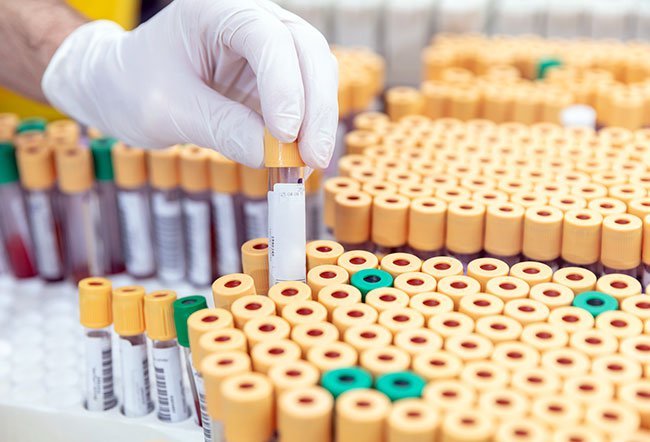Is There a Blood Test for Ovarian Cancer?

Cancer is an uncontrolled growth of the cells. When cancer begins in the ovaries, it is called ovarian cancer. The ovaries are a pair of organs that are part of the female reproductive system. Each ovary is an oval-shaped organ, roughly 2 inches long. The ovaries are in the pelvis on either side of the uterus. Their main function includes producing the egg or ovum and female sex hormones (estrogen and progesterone).
The diagnosis of ovarian cancer involves performing a detailed clinical assessment of the patient, imaging studies and certain blood tests. The cancer or carcinoma antigen 125 (CA-125) blood test is a popularly performed blood test in patients with ovarian cancer.
What is the CA-125 blood test?
CA-125 is known by various other names such as ovarian cancer antigen and CA-125 tumor marker. It is a protein present on the surface of most (but not all) ovarian cells. Thus, significantly high levels of CA-125 may be seen in the blood of patients with ovarian cancer. Because all types of ovarian cancer do not possess this protein, not all women with ovarian cancer will have high levels of CA-125 in their blood.
CA-125 may be elevated in several noncancerous conditions such as:
- Liver disease
- Endometriosis
- Menstrual period
- Pregnancy
- Uterine fibroid
- Pelvic inflammatory disease (PID)
- Pancreatitis
Hence, elevated CA-125 levels do not mean that the patient surely has ovarian cancer. Doctors do not recommend the CA-125 blood test for screening women with low to moderate ovarian cancer risk. The test, nonetheless, does have several important uses such as:
- Monitoring the response to treatment for ovarian cancer (declining CA-125 levels generally mean that the tumor is responding to the treatment)
- Finding out whether the tumor has returned after successful treatment
- Screening women with a high risk of ovarian cancer such as those who have certain abnormal genes, namely, BRCA and BRCA2 genes, or the gene associated with Lynch syndrome or Peutz-Jeghers syndrome; those with a history of cancer of the breast, colon or uterus or those with a family history of ovarian cancer, breast cancer or colorectal cancer (this means any of the first-degree relatives such as mother, sister, grandmother or daughter have had any of these cancers)
The CA-125 blood test is a simple test during which a health professional collects a blood sample from a vein in the patient’s arm by using a small needle. The collection hardly takes five minutes, and the patient does not need to make any special preparation for the test. They may experience slight stinging when the needle goes in and out of their skin. They may also have little pain or bruising at the needle site, but it goes away on its own without generally causing any significant discomfort. The doctor will assess their test results and may refer them to a gynecologist if needed.
What other tumor markers indicate ovarian cancer?
| Tumor markers | Tumor types in the ovaries |
|---|---|
| Alpha-fetoprotein (AFP) | Ovarian germ cell tumors |
| Beta-human chorionic gonadotropin (beta-hCG) | Ovarian germ cell tumors |
| Human epididymis protein 4 (HE4) | Alternative to CA-125 (HE4 is more sensitive) |
| Inhibin A and inhibin B | Mucinous epithelial carcinoma and granulosa cell tumors of the ovaries |
| Carcinoembryonic antigen (CEA) | Nonspecific tumor marker of ovarian cancer |
Are tumor marker tests enough to diagnose ovarian cancer?
CA-125 or any other tumor marker alone cannot be used to diagnose ovarian cancer. The doctor may diagnose ovarian cancer by using a multipronged approach that includes:
- Taking a detailed medical history including details about the symptoms, any underlying health conditions and any significant personal or family history of ovarian, breast or colorectal cancer.
- Performing a thorough physical examination, particularly a pelvic exam, to look for a bulky ovary or ascites (signs of fluid in the abdomen).
- Ordering imaging tests such as an ultrasound, a computed tomography (CT) scan, a magnetic resonance imaging (MRI) scan, a positron emission tomography (PET) scan and a barium enema X-ray (to see whether cancer has spread to the large bowel) (a chest X-ray may also be done to check whether cancer has spread to the lungs).
- Getting a biopsy done, which includes taking a small tissue sample from the tumor and examining it under the microscope. The biopsy sample may also help stage and grade cancer and determine the presence of special proteins (such as hormone receptors) that help plan a proper treatment regimen.
- Performing a laparoscopy to examine the pelvic organs, including the ovaries, by inserting a laparoscope (a thin, flexible tube with a light source and camera) into the abdomen through a small incision (cut).
- Ordering certain blood tests such as blood counts and bleeding and clotting time and tests to check the levels of certain important substances such as hCG, lactate dehydrogenase (LDH), AFP and CA-125 that are linked with ovarian cancer.
